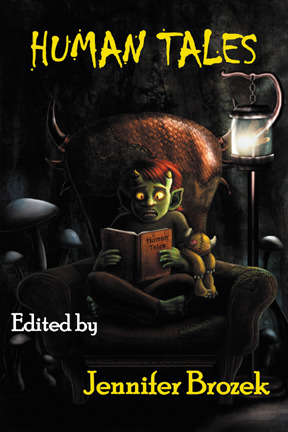Human Tales attempts to take “fairy tales” – the stories of all the bad things the mystical world perpetrates upon humans – and turn the concept on its head. These are the stories that the magical and mystical world tells to warn their children about humans.
Short version:
Graded as a solid B. Some really good stories, and a lot of pretty good ones. It’s a bit uneven at times, and probably should not be read straight through. Several stories have small missteps, either because of the method of telling the story or because they don’t have enough of a punch at the end. Despite these small flaws, it’s a good anthology and worth the price of admission. A few potential triggers exist for child abuse and those who have dealt with attachment disorders.
Long version:
I like fairy tales. I like subversion of fairy tales. Rewritten fairy tales. Expanded fairy tales. But I also like modern storytelling techniques, and that might be where Human Tales and I didn’t entirely mesh.
If you’ve read the original – and I mean the original, not the cleaned-up versions – of fairy tales, there’s often a disconcerting lack of resolution to them. Things happen, there’s consequences, but … that’s it. I have a strong negative reaction to that – it’s a taste and style thing.
Some of the stories in Human Tales seem to draw on this tradition, and so I think that had something to do with why I didn’t give this anthology full marks. I really enjoy short stories that hit you with a gut-wrenching punch of an ending, and as I was making up notes for this review, I noticed how many times I’d written something like “great story except not enough of a resolution at the very end”.
Because nearly all the writing in this anthology is very good, little stumbles (or things I don’t care for personally) stood out for me. Regardless, the quality of storytelling overall makes this a volume worth picking up and reading.
Some of the stories which were particularly noteworthy:
“Bloody Spindle” by Ivan Ewart. This story fits the bill of the anthology perfectly. Well told, it lets us see the other side of the story nearly without any alteration of the story we already know.
“Riddles” by Seanan McGuire. We only know part of the story of the Sphinxes; Ms. McGuire weaves the bits we know together into a coherent whole. The sphinxes are truly not human, yet she keeps us at a place where we can empathize with them.
“Skin Deep” by Sarah Harvey. This story does an excellent job of showing that all the actors are flawed, illustrating how different motivations and personal weakness can give rise to the stylized morality tales that come much later.
“The Ifrit’s Trial” by Spencer Ellworth. A positively delightful story in voice and tone – even though it’s a darkish topic – up until the last two sentences. While necessary (and I can’t think of a better way to do it), they clunk a bit. In many other tales I wouldn’t have noticed, but it’s such a contrast with the smooth as silk wordsmithing through the rest of the story that it was noticeable.
“Hunger’s Child” by Jess Hartley. I had a very hard time with this story; this is the one that might trigger those who have dealt with children with attachment disorders. Due to my own life history, that ended up upsetting me. Aside from that, this is a very good story that again has the complexity of motivation that you see in “Skin Deep”.
“A Tithe for Homecoming” by Deborah J. Brannon. Dark, mysterious, and twists a few concepts together into a nice interaction of the modern world and the ancient tales. Tree spirits, changlings, and revenge all fall naturally together like leaves on the forest floor. Potential trigger warnings for child abuse.
“Color” by Alma Alexander. I want to like this story more, and perhaps if it were not in this volume, I would. It’s not so much a cautionary tale for non-humans as an inspiriational tale *for* humans. It focuses on what we humans have and don’t appreciate. It’s a good story on it’s own, but I’d suggest reading it separately from the rest of this anthology because it seemed like such a change-up for me.
Additionally, the stories by James L. Sutter, Dylan Birtolo, and Nathan Crowder were quite good, but I would end up repeating myself even more.
Again, take the time to pick up this anthology; it’s worth the price of admission.

